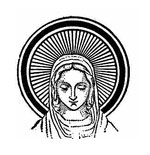
The Virgin Birth: A Problem?
LETTER FROM ENGLAND
England is the preeminent country for the celebration of Christmas. Blessed with Dickens and no separation of church and state (and therefore no killjoy ACLU or anti-Christian political correctness), London’s Trafalgar Square sports not only a magnificent Christmas tree each December, but also a life-size Nativity scene — at public expense, to be sure. So Christmasy are the English that, by August, hotels throughout the country have printed Christmas brochures to entice the populace to celebrate Noël before their respective hearths.
A Sheffield University astronomer, one David Hughes, has, however, just dropped a bombshell (or, rather, shot up a star shelb~ He argues that an unusual conjunction of Jupiter and Saturn on September 15, 7 B.C., marks the true date of our Lord’s birth, so Christmas ought properly to be celebrated three months earlier. So much for Christina Rossetti’s “In the Bleak Mid-Winter”!
To which at least three responses are possible: (1) What’s the big deal? The merchants have almost reached the point of commencing their Christmas promotions that early anyway. (2) Hughes has his stars confused: Surely a planetary conjunction is not going to guide Magi to a particular stable/cave and then stand over it. (3) To quote the London Times‘s third leader on the subject: “The birthday of Jesus is a date for mystery, not precision.”
But if the date isn’t important, why is the manner of that birth? Could we not equally claim, as do so many liberal theologians of both Catholic and Protestant persuasion today, that the precise manner of Jesus’ birth is as unimportant as its date?
You May Also Enjoy
For the past 14 years I have been a volunteer at the shrine in Lourdes. Assignments are based on the needs for staffing and one's physical abilities.
As seen in Mary, women have unique authority as "the source of life in relation to [Christ] in the completion of the New Covenant."
Considering the quantity of literature on abortion that has poured from the academic and popular…

